|
Printables |
PowerPoints |
Online exercises |
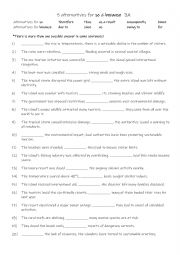
|
B1 5 alternatives for both so & because 3 A
First, students need to familiarise themselves with the 10 words and check their meaning and use. Then they read the sentences to see which one is needed to complete the sentence. Each word is used 2 times! Answers on page 2.
Level: intermediate
Age: 10-100
Type:
Downloads: 117
|
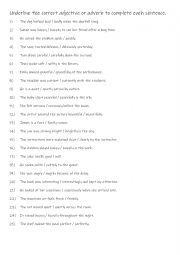
|
B1 Adjective or Adverb practise
Practising adjectives and adverbs is important because it helps learners accurately describe people, places, things, and actions, which enhances both written and spoken communication. Students learn to distinguish between the two and use them correctly, improving sentence variety, fluency, and precision. This is crucial for learners aiming for adva...
Level: intermediate
Age: 9-100
Type:
Downloads: 112
|
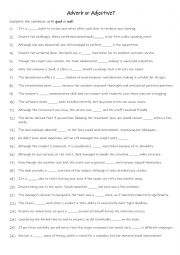
|
B1 adjective or adverb practise using: good or well
Students read the sentences to see if an adjective or an adverb is needed to complete the sentence. 13 sentences require an adjective and 13 sentences require and adverb to complete the sentences. Answers on page 2.
Level: intermediate
Age: 10-100
Type: worksheet
Downloads: 119
|
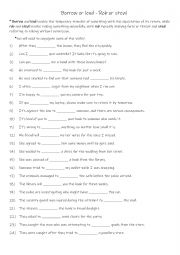
|
B1 Borrow or lend - Rob or steal
Learning the difference between "borrow" and "lend," as well as "rob" and "steal," is crucial for precise communication. "Borrow" means to take something with the intention of returning it, while "lend" means to give something to someone temporarily. Understanding these terms helps avoid misunderstandings in everyday situations. Similarly, "rob" im...
Level: intermediate
Age: 9-100
Type:
Downloads: 108
|
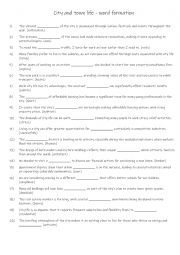
|
B1 City and town life - word formation
Understanding word formation allows students to expand their vocabulary, enabling them to express themselves more precisely and creatively. Knowing how to manipulate words helps them create varied sentence structures, making their writing more engaging and dynamic.Mastering word formation is key to achieving higher levels of language proficiency, p...
Level: intermediate
Age: 9-100
Type:
Downloads: 103
|
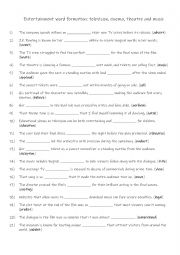
|
B1 Entertainment word formation television, cinema, theatre and music
Understanding word formation allows students to expand their vocabulary, enabling them to express themselves more precisely and creatively. Knowing how to manipulate words helps them create varied sentence structures, making their writing more engaging and dynamic. Mastering word formation is key to achieving higher levels of language proficiency, ...
Level: intermediate
Age: 8-100
Type:
Downloads: 113
|
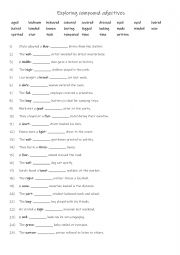
|
B1 Exploring 25 compound adjectives
Compound adjectives provide a more specific description than single adjectives. For example, �high-speed train� is more precise than just �fast train.� This precision helps convey exact meanings and avoids ambiguity.In formal writing, such as academic papers or professional reports, compound adjectives can make descriptions more precise and your ar...
Level: intermediate
Age: 10-100
Type:
Downloads: 103
|
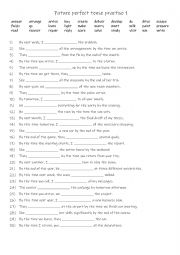
|
B1 Future perfect tense practise 1
Students need to learn the future perfect tense because it allows them to express actions that will be completed at a specific time in the future. This tense helps convey a sense of timing and completion, making it useful for discussing goals, predictions, and plans. Mastering the future perfect tense also improves overall fluency by providing stud...
Level: intermediate
Age: 9-100
Type:
Downloads: 106
|
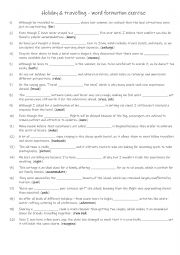
|
B1 Holiday & travelling - word formation exercise
Understanding word formation allows students to expand their vocabulary, enabling them to express themselves more precisely and creatively. Knowing how to manipulate words helps them create varied sentence structures, making their writing more engaging and dynamic.Mastering word formation is key to achieving higher levels of language proficiency, p...
Level: intermediate
Age: 9-100
Type:
Downloads: 103
|
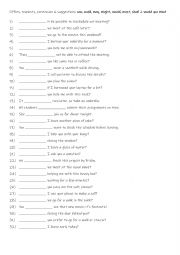
|
B1 Offers, requests, permission & suggestions - can, could, may, might, would, must, shall & would you mind
First, students familiarise themselves with the 8 modal verbs and their usage. Then they read the sentences to see which modal verb is needed to complete the sentence. Each modal is used 4 times. Answers on page 2.
Level: intermediate
Age: 8-100
Type:
Downloads: 105
|
|
|
|
|












